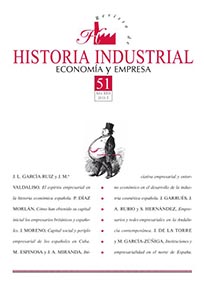Institutions and entrepreneurship in the north of Spain, 1885-2010
Keywords:
Entrepreneurship, Entrepreneurship Indicators, Institutions, Regional EconomicAbstract
This paper addresses entrepreneurship in northern Spain between 1885 and 2010. We review first the theoretical and empirical literature and their use by economic historians. Then, from a Schumpeterian perspective, we make a longitudinal study of business creation rates in the Basque Country, Navarre, La Rioja, and Saragossa during this period. The aim is to make a comparative analysis with the Spanish rate to observe provincial differences in business creation. Finally, the role of regional and provincial governments as a source of incentives and opportunities for business is considered. The economic success of Álava and Navarre lay partly in their special economic and administrative systems —quite different from the rest of Spain— which offered tax incentives for business to locate there and therefore stimulated greater entrepreneurship.Downloads
Downloads
Published
How to Cite
Issue
Section
License
The author assigns all rights to the publisher. Creative Commons
The author who publishes in this journal agrees to the following terms:
- The author assigns all intellectual property rights exclusively to the publisher for the entire duration of the applicable intellectual property rights.
- The publisher will distribute the texts under the Creative Commons Attribution License, which allows others to share the work, provided that they acknowledge the authorship, its initial publication in this journal, and the conditions of the license.





